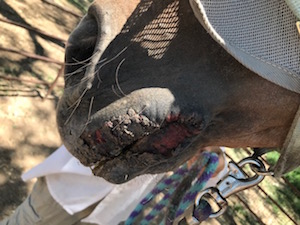 Symptoms of Vesicular Stomatitis Virus may include oral lesions, oral blistering and drooling. A lesion is visible on the mouth of this horse in New Mexico. (Photo courtesy New Mexico Livestock Board)(Albuquerque, New Mexico) – As fair season approaches, the New Mexico Livestock Board announced several recommendations as a result of confirmed Vesicular Stomatitis Virus (VSV) cases in New Mexico horses.
Symptoms of Vesicular Stomatitis Virus may include oral lesions, oral blistering and drooling. A lesion is visible on the mouth of this horse in New Mexico. (Photo courtesy New Mexico Livestock Board)(Albuquerque, New Mexico) – As fair season approaches, the New Mexico Livestock Board announced several recommendations as a result of confirmed Vesicular Stomatitis Virus (VSV) cases in New Mexico horses.
New Mexico State Veterinarian Dr. Ralph Zimmerman urges people to be diligent.
“While we are not ordering the cancellation of any events at this point, we recommend several advisable steps to keep animals safe,” said Zimmerman. “I encourage common sense decision making and overall awareness of the situation.”
Following is a list of recommendations for fair organizers, rodeo organizers and for individuals bringing animals to events:
- Either an Extension agent, local veterinarian or a knowledgeable livestock person should be present at entry gates to check animals’ mouths for lesions (using fresh gloves for each animal)
- Questionable animals should be sent home before they enter the grounds
- The use of fly spray is encouraged
- Do not handle other people’s animals
- Avoid sharing grooming equipment
- Use your own water buckets
- If an animal breaks with Vesicular Stomatitis on the grounds, send them home immediately
At this point, state officials are not requiring a Certificate of Veterinary Inspection for intrastate travel.
VSV cases have been confirmed in Valencia, Sandoval, Los Alamos and Santa Fe Counties thus far.
The virus can affect horses, cattle, sheep, goats, swine, camelids (alpacas and llamas) and cervids (deer species). Symptoms may include oral lesions, oral blistering and drooling, but please refer to the New Mexico Livestock Board website for more detailed information: https://www.nmlbonline.com/news.
Please be sure to contact your veterinarian if you plan to travel from New Mexico to other states with horses or other livestock. This disease is reportable in New Mexico, meaning animal owners are required to notify USDA or the state veterinarian if your veterinarian suspects VSV.
If you suspect Vesicular Stomatitis Virus, please contact the New Mexico State Veterinarian Dr. Ralph Zimmerman at 505-841-6161 or USDA-Animal and Plant Health Inspection Service (APHIS)/USDA-Veterinary Services (VS) at 505-313-8050.